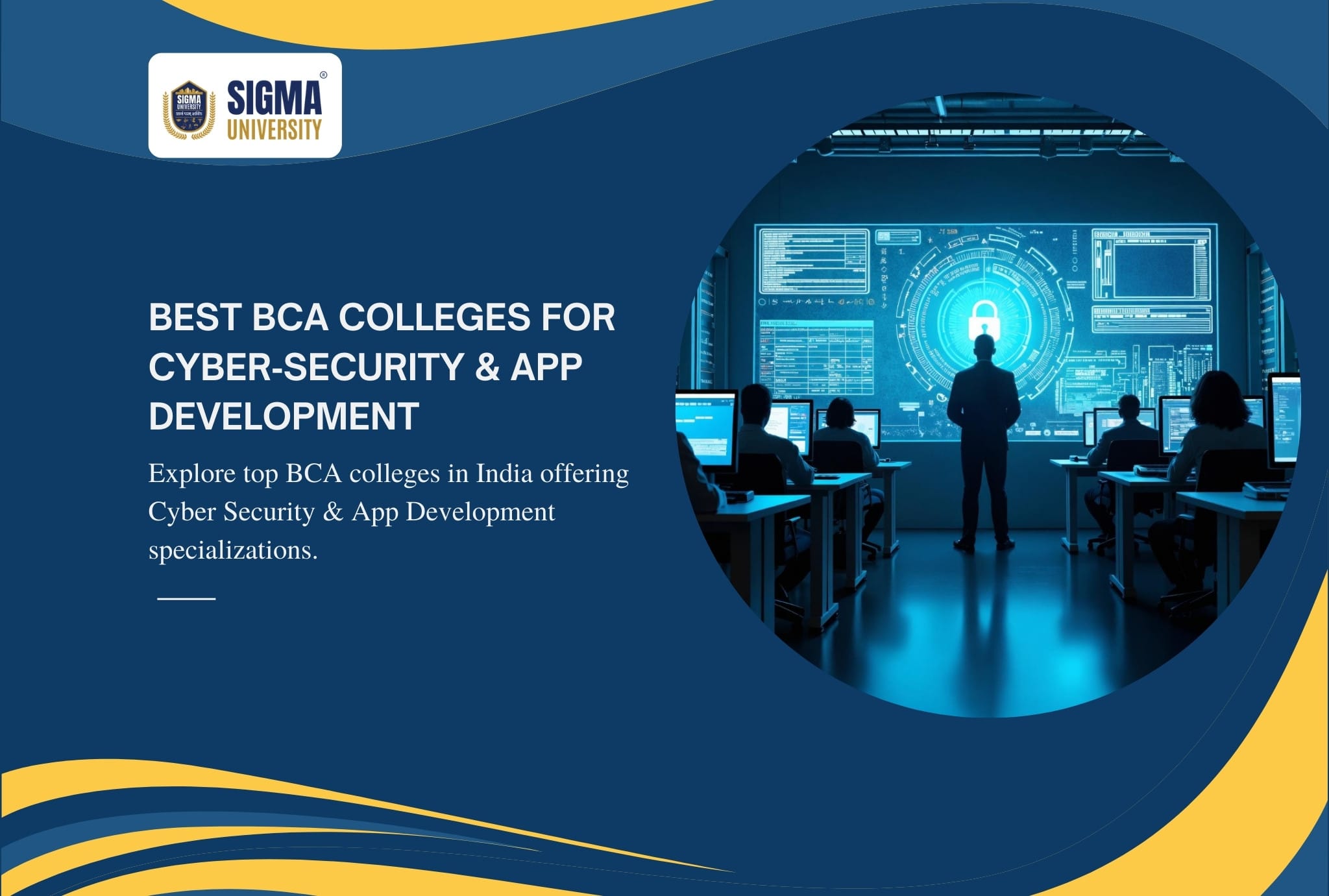A Bachelor of Computer Applications (BCA) is no longer a generic tech degree. In 2025, the best BCA colleges in India offer focused tracks in Cyber Security and App Development, mapping directly to market demand. Cyber incidents are rising across industries, while every business, from banking to healthcare, is using mobile apps. If you’re shortlisting top BCA colleges or comparing BCA in Cyber Security versus BCA in App Development, this guide breaks down industry demand, skills, curriculum, admissions, fees, placements, and how to choose the right institute.
Why Choose BCA in Cyber-Security or App Development?
Cybersecurity sits at the core of digital trust. From safeguarding payment systems and healthcare records to securing critical infrastructure, employers now expect entry-level analysts to know threat modeling, SOC workflows, endpoint hardening, and cloud security basics. App Development, meanwhile, powers customer experiences on Android and iOS; developers who can ship secure, performant apps with polished UI/UX, API integrations, and analytics are in short supply. A BCA in Cyber Security or BCA in App Development gives you a structured path into these growth areas, often with industry certifications and hands-on labs built into the program. Many top BCA colleges pair these tracks with internships and capstone projects, so your portfolio is work-ready on graduation.
Industry Demand & Future Scope
Across sectors, cyber talent gaps are widening, creating steady job security and strong salary potential for graduates who can read logs, triage incidents, write detection rules, and build secure-by-design systems. Cyber roles increasingly intersect with AI for anomaly detection and with cloud-native security. On the app side, the explosion of fintech, health tech, logistics, and D2C brands keeps mobile engineers perpetually in demand. Cross-platform frameworks (Flutter, React Native) and Kotlin-first Android stacks have matured, while backend skills (Node/Java/Python) and DevOps familiarity amplify employability. The net effect: BCA graduates with these specializations can target start-ups, MNCs, product firms, and IT services with clear growth ladders.
Skills You Gain in These Specializations
A strong BCA Cyber Security track builds foundations in networks, operating systems, scripting, and security architecture before moving into ethical hacking, cryptography, SIEM/SOC operations, incident response, forensics, and cloud/IAM. You also pick up secure coding and compliance basics (OWASP, PCI-DSS). A BCA in App Development emphasizes Java/Kotlin, Swift, or cross-platform (Flutter), UI/UX fundamentals, REST/GraphQL APIs, database management, app performance, testing/CI-CD, and store deployment workflows. Together, these skills align with roles like Security Analyst, SOC Analyst, Ethical Hacker and Mobile App Developer, Front-end Engineer, and UI/UX Designer.
Top BCA Colleges in India Offering Cyber Security & App Development
Below are examples of institutions, public, private, and university-backed, offering relevant specializations or strong tracks closely aligned with cybersecurity and app development. Always verify the current syllabus, fees, and eligibility on official portals before applying.
Top BCA Colleges for Cyber Security
- Sigma University, Vadodara (Gujarat) – Sigma offers a BCA program with university recognition and a technology-forward ecosystem. Its program documents list standard BCA duration (3 years) and eligibility (10+2 recognized board). Sigma’s broader tech schools are UGC/AICTE recognized, with Gujarat state affiliations noted in program literature, making it a strong regional choice with practical exposure.
- JAIN (Deemed-to-be University), Kochi Campus – Offers BCA (Cyber Security) integrated with EC-Council modules, valuable for industry-recognized skills and labs. This integration signals a certification-aware curriculum designed for SOC and blue-team readiness.
- Amity University, Mohali – Provides BCA with Cyber Security as a specialization focus; Amity’s large network and industry tie-ups help with projects and internships.
- Rayat Bahra University (RBU), Mohali – Runs a BCA with Specialization in Information Security in collaboration with HCL, offering an employability-aligned curriculum and exposure to enterprise environments.
Top BCA Colleges for App Development
- Poornima University (Jaipur) – Offers BCA (Mobile Applications) with an explicit Android/iOS skill path, giving clarity to students seeking an app-first career. The official page details the specialization and structure.
- Lovely Professional University (Punjab) – LPU’s BCA suite includes modern stacks (e.g., AI-ML track). While the specific “Mobile App Development” tag varies by year, its curriculum usually covers Android, full-stack basics, and industry workshops worth exploring if you want broader app + data exposure.
- VIT (Vellore Institute of Technology) – A respected tech brand with UG computing programs and industry-backed pedagogy. Though specializations change, VIT’s UG computing degrees remain strong feeders into app dev roles thanks to projects, labs, and corporate connections.
Note: Institute offerings evolve; cross-check the latest BCA curriculum with Cyber Security or App Development mentions during application season.
Curriculum Overview for Cyber Security & App Development in BCA
Key Subjects in BCA Cyber Security Track
Expect computer networks, operating systems, programming (Python/Java), databases, then Network Security, Web Security, Cryptography, Ethical Hacking, Digital Forensics, Cloud Security, SIEM & SOC Operations, Vulnerability Assessment & Penetration Testing, and Risk/Compliance. Many programs encourage EC-Council/CompTIA electives to validate skills. (For certification-integrated sample, see JAIN Kochi’s EC-Council-aligned path.)
Key Subjects in BCA App Development Track
Common modules include Java/Kotlin, Flutter (Dart) or React Native (JS), UI/UX Principles, RESTful APIs, SQLite/Room/Firebase, App Performance & Testing, CI/CD, and Play Store/App Store Deployment. Programs like Poornima’s “Mobile Applications” make these modules explicit.
Admission Process and Eligibility Criteria
Most best BCA colleges in India ask for 10+2 from a recognized board. Mathematics or Computer Science is preferred, but not always mandatory; cut-offs vary by college. You’ll typically apply online, upload documents, and, in select institutes, sit for an aptitude test or interview. As an example, Sigma University’s BCA program literature specifies a 33-year duration and 10+2 eligibility within recognized norms (UGC/AICTE presence and state approvals).
Fee Structures for BCA in Cyber Security & App Development
Fees range widely based on brand, labs, location, and industry tie-ups. Government colleges tend to be more affordable; private universities charge more for smaller cohorts, specialized labs, and certification bundles. For instance, Poornima’s BCA page indicates transparent semester-wise tuition, reflecting an accessible fee model for a focused app specialization. Use such official fee pages as benchmarks while you compare institutions.
Placement Opportunities & Career Prospects
BCA graduates from Cyber Security tracks typically start as Security Analysts, SOC Analysts, Vulnerability Analysts, Jr. Pen Testers, or GRC Associates. With experience and certifications (CEH, Security+, AZ-500, CCSP), they grow into Threat Hunters, Incident Responders, and Cloud Security Engineers. App development graduates step into Android/iOS Developer, Cross-platform Engineer (Flutter/React Native), Front-end Developer, or UI/UX Designer roles. Recruiters range from IT services firms and product companies to start-ups, fintechs, and healthcare tech. Salary varies by city and portfolio; demonstrable projects, internships, hackathons, and GitHub profiles significantly lift outcomes.
Career After BCA in Cyber Security
A strong SOC foundation plus scripting (Python/Bash), log analysis, and exposure to SIEM tools (e.g., Splunk, QRadar) can rapidly elevate your profile. Colleges partnering with certification bodies (like EC-Council in JAIN Kochi’s example) help you stack credentials early.
Career After BCA in App Development
Employers expect clean code, design patterns (MVVM/MVI), performance profiling, and UI/UX empathy. Portfolios featuring 2–3 polished apps deployed on the Play Store/App Store often outperform traditional résumés. Institutes that embed capstones and industry mentoring (as highlighted by Poornima’s specialization approach) give you an edge.
BCA vs B.Sc in Cyber Security: Which is Better?
BCA is application-oriented, focusing on development skills, applied security, and deployment. B.Sc (Cyber Security) leans more academic, with deeper theoretical treatment of algorithms, systems, and research exposure. If you want to build and ship (apps, tools, automations) and hit the job market quickly, BCA is compelling. If you’re drawn to theory, research, or future MS/PhD pathways, a B.Sc. can be the better springboard. Both are valid, match the program style to your learning preference, and your end goal.
Tips for Choosing the Right BCA College
Start with accreditation and recognition (UGC/AICTE/NAAC), then examine the curriculum map to confirm specialized modules and labs. Ask about faculty industry experience, live projects, hackathons, internships, and placement partners. Review sample capstones and student portfolios. Study fee structures and clarify what’s included (certifications, lab access, cloud credits). Shortlist 4–6 colleges, speak with current students/alumni, and attend open houses. Sigma University’s program literature, for example, clearly positions a recognized 3-year route with standard BCA eligibility; use such documents to align expectations and validate compliance.
Conclusion
Choosing the best BCA colleges in India for Cyber Security or App Development is ultimately about fit: the skills you want, the projects you’ll build, the mentors you’ll learn from, and the recruiters you’ll meet. A targeted BCA in Cyber Security can launch you into SOC roles and blue-team careers that compound rapidly with certifications and experience. A focused BCA in App Development can put you on the frontlines of digital products designing, building, and iterating user experiences used by millions.
With the right college and a portfolio that proves your skills, you’ll graduate ready for roles in cyber defense or app engineering, two of the most future-proof pathways in tech today.
Frequently Asked Questions (FAQs)
What subjects are taught in the CA app development?
BCA app development covers programming languages, mobile app frameworks, database management, UI/UX design, cloud computing, operating systems, and project work, ensuring students gain hands-on skills in software and mobile application development.
What are the career options after BCA in cybersecurity?
Graduates can become cyber security analysts, ethical hackers, penetration testers, network security engineers, incident responders, or security consultants. They may also pursue higher studies like MCA or specialized cybersecurity certifications.
Are placements good in BCA cybersecurity colleges?
Yes, placements are strong in reputed BCA cybersecurity colleges. Companies in IT services, banking, consulting, and government sectors hire graduates for roles in security analysis, ethical hacking, and digital forensics.
What’s the eligibility for BCA in app development?
Eligibility usually includes passing 10+2 with mathematics or computer science as a subject. Some colleges accept students from any stream with minimum marks criteria, depending on the university’s admission policy.
Which colleges offer BCA with mobile app development specialization?
Several universities in India, including Sigma University, offer BCA programs with app development specializations. These courses focus on Android, iOS, and cross-platform application design, supported by labs, workshops, and industry-driven projects.
Can I pursue ethical hacking through a BCA program?
Yes, BCA programs with a cybersecurity specialization often include ethical hacking modules. Students can further enhance their expertise through certifications like CEH, CompTIA Security+, or OSCP alongside their degree.
What’s the difference between BCA and B.Sc. in Cyber Security?
BCA focuses on computer applications, programming, and app development with optional cybersecurity. B.Sc Cyber Security emphasizes security fundamentals, cryptography, and forensics, making it more research-oriented than BCA’s application-driven approach.
Do top BCA colleges have industry tie-ups for internships?
Yes, top BCA colleges partner with IT companies, startups, and research organisations for internships. These tie-ups provide industry exposure, practical training, and networking opportunities, improving employability and real-world learning outcomes.


